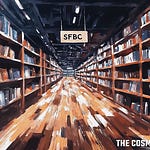by Brian Scott Pauls
SPOILER ALERT: This article contains details about Beyond the Shore by Tania Fordwalker. If you haven’t read the short story, you may want to stop reading this article now.
As an uncle of niblings, and a father of daughters, Beyond the Shore moved me in a way I had not expected.
Fordwalker’s story, found in the November issue of Lightspeed, is ostensibly a plague tale. All over the world, from wherever they happen to be, people begin walking toward the ocean. As they travel, they lose their hair and skin, transforming into aquatic creatures.
I say “ostensibly” because the story is really about how humans deal with change. This includes the cost of refusing to embrace the new and different.
Dyl Gibson is a virologist in the infection-ridden, climate-altered world of 2060. He’s built his career combatting the novel viruses of an overheated Earth. Gibson fights to hold the line against an intransigent, hostile environment. His daughter, then his wife, succumbs to the latest outbreak. Still, Gibson can't accept his inability to “save” them.
Fordwalker’s parable is “pathetic” in the best way—through the expert deployment of “pathos”. Empathetic readers will grieve for Gibson. He obsesses over preventing or reversing the effects of the virus, even as he loses his family.
Despite these personal crises, Beyond the Shore is only three-quarters tragedy. Gibson’s family also suffers loss, but they make it through to the “promised land” on the other side of that loss. Unlike Gibson, they do embrace the new and different. As a result, they escape the struggle to survive in a world no longer suitable for human bodies.
The element I found resonated most was the transformation of Gibson’s daughter. A teenager, she is not afraid of the changes she’s seeing and experiencing—she’s excited by them. Like many parents in our real world, Gibson doesn’t understand—doesn’t want to understand. He’s committed to stopping these changes by any means necessary. In time-honored sf fashion, this includes experimenting on himself. He succeeds, but only for himself. In the process, he eliminates the possibility of ever rejoining his family. His consolation prize is more haunting than comforting.
Our global society is approaching divergent choices where change is inevitable. Continuing on the way we always have will no longer be an option. Let us hope we are open to new and different possibilities, and we have the wisdom to look beyond the shore.
Recommendation: Read it!













